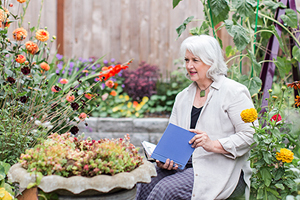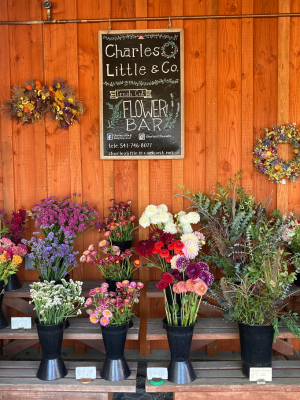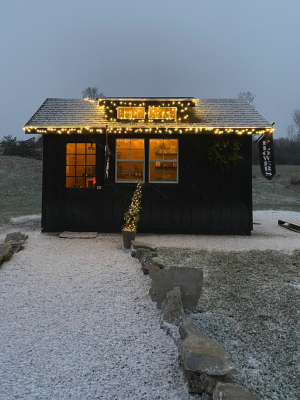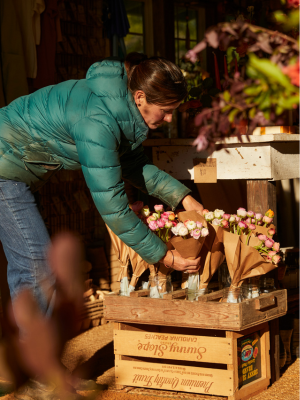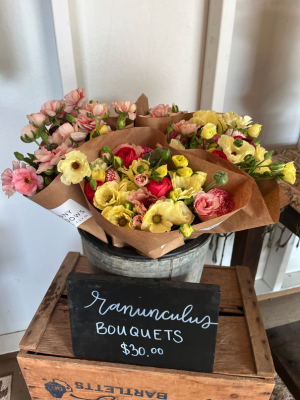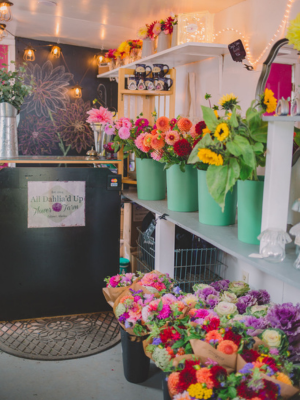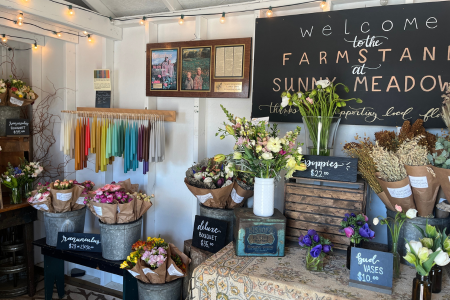- 3 Easy, Reliable, Productive Cut Flowers: Sunflowers, Zinnias & Rudbeckia
- 5 Factors That Determine Vase Life of Cut Flowers
- 2019 American Flowers Week: Combining the Art of Floral Design & Couture
- Celebrate the 7th American Flowers Week | Johnny's 2021 Botanical Couture
- Celebrating the 8th American Flowers Week | Johnny's 2022 Botanical Couture
- Collective Selling Models for Flower Farmers: Flower Hubs That Work
- 5 Cool Flowers to Plant Now | Lisa Mason Ziegler's Secrets for Growing Hardy, Cool-Season Annuals
- Cut-Flower Harvesting & Post-Harvest Care | Best Practices from Pros in the Slow Flower Community
- Cut-Flower Kit | Guide for Market Growers (PDF)
- Easy Cut-Flower Garden Map | For Growers New to Flowers (PDF)
- Easy Cut-Flower Garden Planner | For Growers New to Flowers (PDF)
- From Color to Climate: 5 Floricultural Trends Subtle & Seismic
- Flower Culture by Crop | Comparison Chart | Days to Germination, Weeks to Transplant, Days to Harvest (PDF)
- Flower Farmers' Favorite Fillers & Foliage | Recommendations from 3 Farmer-Florists
- Getting Started in Cut-Flowers | Top 15 Cuts
- Heat & Drought: How Flower Farmers Are Adapting to Changing & Challenging Climatic Conditions
- Introduction to Overwintering Flowers | Guide to Overwintering Flowers
- An Introduction to Producer Marketing Cooperatives | M Lund & Associates
- How Day Length Affects Cut-Flower Production
- Growing Flowers in Hoophouses & High Tunnels: Cool-Weather & Hot-Weather Options
- Starting a U-Pick Flower Farm, From A-to-Z
- Roadside Flower Stand Basics: Success Tips for On-Farm Retail
- Year-Round Flower Production Strategy
- Overwinter Flower Trials | Multiyear Results for 30+ Crops | Johnny's Selected Seeds | XLSX
- Seeding Date Calculator | Johnny's Recommended Flowers for Overwintering | XLSX
- Pricing & Profitability for Flower-Farmers | Pointers from a Diversity of Pros
- Just Add Flowers | An Introduction to Companion Planting for Vegetable & Herb Gardeners
- Sustainable Farming Methods | A Survey of Flower Farmers' Best Practices
- Slow Flowers Palette & Petal Crushes | Evolving Colors & Shape-Shifts in Floral Industry Trends
- Johnny's and Slow Flowers | Johnny's Selected Seeds
- Slow Flowers | Celebrating Fifth-Season Regional Design Elements
- Slow Flowers Floral Forecast | A Summary of Industry Insights & Trends
- Slow Flowers | Building a Better Market Bouquet | Tips & Techniques for Flower Farmers
- Slow Flowers | Tips for Staging On-Farm Floral Workshops | Johnny's Selected Seeds
- Wedding Wisdom 101 | 10 Beginner Tips for Entering the Wedding Floral Landscape
- Succession-Planting Flowers | Scheduling & Planning, Sowing Frequency, Recordkeeping & Recommendations
- Succession-Planting Interval Chart for Flowers
- Sustainable Floral Design | Techniques & Mechanics for Foam-Free Floristry | Tobey Nelson & Debra Prinzing
- Video: Mason Jar Bouquet Tutorial
- Video: How to Build a Bouquet
- Video: Tobey Nelson | Sustainable Floral Design | Slow Flowers Summit
- Video: Economic Considerations in Overwintering Cut Flowers | Johnny's Selected Seeds
- Top 10 Cut-Flower Varieties for Direct Seeding
- Video: Floating Row Cover | Baby "Cool Flower" Protection from Whipping Winter Winds
- Video: The Procona System for All-in-one Flower Harvest, Transport & Display
- Johnny's Overwinter Flowers Tunnel: Trellising, Supports, Ground Cover & Spacing
- Video: Irrigation Considerations for the Overwinter Flowers Tunnel | Johnny's Selected Seeds
- Video: Johnny's Overwinter Flowers Trial Recap
- Video: Producer Cooperatives for Small-Scale Farmers | Johnny's Webinar Series
- Climate Adaptation for Vegetable & Flower Farmers | Johnny's Educational Webinar Resources
- Webinar Slide Deck | New-for-2023 Flowers & Floral Supplies | PDF
- Chrysal Clear Bulb Flower Conditioner | SDS
- Chrysal Professional 2 Transport & Display T-Bag | SDS
- Chrysal Classic Professional 2 Transport & Display (Holding) Solution | SDS
- Webinar Slide Deck | Flower Growing in Southern States | PDF
- Choosing Flower Crops to Overwinter | Guide to Overwintering Flowers
- Edible Flowers List: Top 20 Favorites from the Slow Flowers Community
- Bloom to Boom: Flower Farm Profitability
- Choosing Tulip Varieties for Forcing | Guide to Forcing Flower Bulbs
- Forcing Tulip Bulbs | Guide to Forcing Flower Bulbs
- Snapdragon Groups Explained
- Flowering in the South: Profiles of 5 flower farmers who cope with temperature, humidity, pest & weed pressure
- Video: Flower Growing in Southern States | Johnny's Webinar Series
- 10 Tips for Building a Profitable Cut-Flower Business
- Introduction to Forcing Flower Bulbs in Soil | Guide to Forcing Flower Bulbs
- U-Pick Power for Your Flower Farm | Johnny's Webinar Series
- Eat Your Flowers: Serve Up That Wow Factor With Edible Flowers
- Flower Growing in Southern States | Johnny's Educational Webinar Series
- Chrysal CVBN Flower Conditioner | SDS
- Chrysal Clear Bulb T-Bag | Cut-Flower Conditioner | SDS
- Chrysal Professional 1 Hydration Solution | SDS
- Chrysal Professional 3 Vase Solution Powder | SDS
- When to Start Seeds for Overwintered Flowers | Guide to Overwintering Flowers
- Chrysal Clear Universal Flower Conditioner | SDS
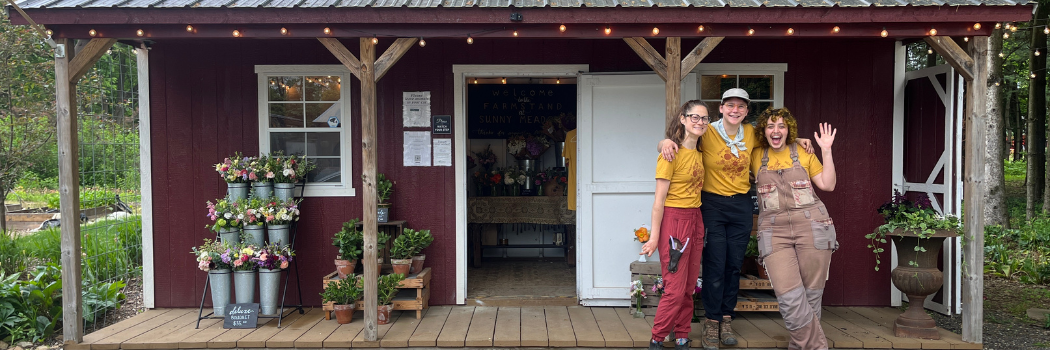
Roadside Flower Stand Basics: Success Tips for On-Farm Retail
By Debra Prinzing, Slow Flowers Society, February 2025
It might seem that it’s a short journey for local blooms to travel from a grower’s field to the flower lover’s vase, but so much depends on how and where flower sellers connect with their buyers. For decades, growers have depended on farmers’ markets as one of their most reliable sales venues. Farmers’ markets provide one of the best ways for beginners to showcase their floral crops, test out varieties and pricing, and develop a loyal customer base. Markets serve as low-cost business incubators that can “launch” a young agricultural enterprise. And there’s no denying that when farmers’ markets are well-run, they generate a sense of community and excitement that entices consumers who love the vibe and appreciate having access to hyper-local flowers (not to mention food).
Yet, there is a cost to selling through a farmers’ market, and not everyone can justify what that involves, whether it’s time, transportation, labor, or the potential shrink of unsold product. As flower farms mature and evolve, inevitably, the entrepreneurs who own those farms begin to tinker with their business models. One of the questions they ask is, “are there better direct-to-consumer channels besides my farmers’ market?”
I turned to five farms in the Slow Flowers community to quiz them about on-farm retail and the many considerations faced in setting up a farm stand or farm store. I recently interviewed each for my forthcoming book, The Flower Farmers: Inspiration and Advice from Expert Growers (Abrams, May 2025), which I co-authored with Robin Avni. They include:
- Abby and Derek Matson of Diddle & Zen (Panton, Vermont)
- Mandy and Steve O’Shea of 3 Porch Farm (Comer, Georgia)
- Gretel and Steve Adams of Sunny Meadows Flower Farm (Columbus, Ohio)
- Misty Vanderweele of All Dahlia’d Up Flower Farm (Palmer, Alaska)
- Bethany and Charles Little of Charles Little & Co. (Eugene, Oregon)
For this overview, I asked about the reasons and benefits of opening a farm stand; advice on location and parking; insurance and security recommendations; best hours and days of operation; farm stand staffing or self-service methods; and tips on bestselling items.
While the structures and purposes of their farm stands may differ, all of these growers say that opening an on-farm retail location has given them the control not offered by farmers’ markets. My personal observation is that when done well, the farm stand reflects the farm owners’ lifestyle, adapting to the needs and circumstances of a family-owned operation.
“My advice for anyone who’s looking into opening an on-farm retail location?,” says Mandy O’Shea of 3 Porch Farm. “Be comfortable trying different iterations, because what works for someone else might not work for you. Give something a try until you find your sweet spot, but don’t hang onto it too long if it doesn’t work for you! It always comes back to knowing your customer and giving them more of what they like and want.”
In addition to providing an important income stream, the farm stand can achieve many other goals, these growers explain. Read on to learn more.
Benefits of Selling Flowers Roadside
The festive atmosphere of a farmers’ market is a special one, nurturing collegiality between growers and shoppers. Misty Vanderweele feels nostalgic about the relationships she made while getting started as a grower at the Anchorage Farmers’ Market. Eventually, though, she transitioned to on-farm floral sales in 2022, opening her flower stand in a 12-by-20-foot repurposed storage shed. “The farmers’ market, for me, cost time and money. It was really hard to give it up because I really love the camaraderie; I love the other vendors, including members of my family who run the market.” That said, Misty appreciates the “high-touch camaraderie” of having an on-farm retail destination, which she calls her “Flower Stand.” “Remember, a flower stand or farm stand can be totally customizable to fit your farm,” she notes.
Gretel and Steve Adams of Sunny Meadows Flower Farm suspended market sales when the COVID-19 Pandemic shut things down for theirs and most every other farmers’ market across North America. “We thought that maybe we could bring people to us, so we decided to test it out,” Gretel says. “Our first stand was a little lean-to that we built, with some buckets of flowers and potted lilies, but that wasn’t really enough to protect flowers from the elements.”
Since 2018, after several iterations, the Adams sell their flowers in a 12-by-20-foot shed-like structure called the “Farmstand.” Because their largest volume of flower sales supplies grocery stores through their wholesale program, they value having a retail location to keep in touch with the end consumer. “The more wholesale-focused we get, the further disconnected we are from the final customer,” Gretal observes. “Now, our Farmstand serves some members of the community who used to shop for our flowers at the farmers’ market.” Still, she realizes that other customers prefer the convenience of buying Sunny Meadows’ bouquets at the grocery store. “It takes a little extra effort to come to the Farmstand,” she says.
Like Sunny Meadows’ shift from a farmers’ market to on-farm sales, Mandy and Steve O’Shea of 3 Porch Farm say their move was pandemic-driven. They first experimented with appointment-shopping in order to stage their spring plant sale, an event that (prior to the pandemic) had reached the scale of an epic, outdoor music festival. “We had to figure out how to have people sign up for 15-minute, no-contact appointments when they could pick up their plant orders,” Steve explains. “As the pandemic evolved and things started to stabilize, we realized that as our business model was shifting away from local farmers’ markets in order to run our shipping program, having a farm store could be a nice way to connect to the community.” They acquired a 12-by-20-foot “fancy shed,” the inside of which they finished with recycled wood trim. Steve used old posts to support an overhanging front roof, giving the farm store a quaint personality. In addition to supplying seasonal, locally-grown 3 Porch Farm flowers, the farm store allows their followers and fans to experience their farm on a small scale. “It’s not necessarily the biggest revenue generator for us,” Steve continues. “But having it truly comes from a place of wanting to stay in touch with the local community and providing them a beautiful place to come. There’s a lot of altruism and less capitalism here.”
Similarly, welcoming customers to Charles Little & Co.’s farm store from May through mid-December is one way that Bethany feels she can give back to her community. “Eugene is my town. I was born and raised here and spaces like ours are disappearing. We have cozy, cool spaces here in the summer. We have benches with cushions and sometimes people just sit and wait for someone in their group to pick flowers, or watch the birds at the bird feeder, or hang out in the shade. Hopefully, they also shop when they’re here!”
Location & Parking
When Abby and Derek Matson built the farm stand at Diddle & Zen in 2021, it allowed them to add a retail channel for their flowers. “We were doing a little bit of wholesale; we were doing weddings, but we wanted more opportunities to sell,” Abby says. They placed the 9-by-14-foot shed on a level area of their property, locating it to meet the 50-foot setback requirement, per country regulations. The farm faces Jersey Street, which is on the route to the Crown Point Bridge, one of the few southern ways to cross Lake Champlain into New York State. Summer residents also take this road to and from a popular resort and boating club, which makes it easy to stop and pick up flowers (rather than driving into the closest town). Vermont is very flexible with farm stands, Abby notes. “There’s now a state law that allows any farm to have a store on their property.”
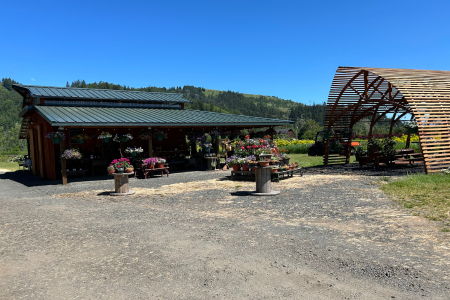
The farm stand at Charles Little & Co. started as just some planks on cinder blocks and has evolved over the years to include their eye-catching lath shade structure.
Photo © Bethany Little.
Charles Little & Co. has operated some type of farm stand or farm store on Eugene’s Seavey Loop Road for years. The road is a frequently-traveled route for hikers heading to the Mount Pisgah Arboretum. “Back in 1987, our ‘farm stand’ was just some planks on cinderblocks, arranged around the old English walnut tree,” Bethany says. At the time, Charles Little & Co. sold fresh flowers like larkspur to dried floral crafters. Several decades later, the permanent farm store continues to serves the crafting crowd, but it is also stocked as a flower shop, plant nursery, art gallery, and home décor shop. The destination expanded three years ago, when a retired contractor friend wanted a project to use up some custom-milled lath strips. “Charles said, ‘let’s build a lath house,’ and I suggested we build it the shape of our barn,” Bethany explains. The lath house now serves as a shade structure adjacent to the farm store. Its unique shape mimics the soaring Dutch-style roofline of their three-story barn and is guaranteed to stop traffic, Bethany says. “So many people have stopped because of it, and they tell us, ‘I drive by here all the time and I’ve never stopped – this is amazing! What is it?’”
Now, the lath house draws people in, but so does the farm store, which the same contractor renovated with a deep, hip roof and shed-style overhangs. As a result, the busy corner on Seavey Loop Road is the hub for Charles Little & Co.’s many customer-facing activities, including workshop and U-Pick check ins, and of course, shopping.
Having a farm store on a high-traffic road is a challenge, Misty says. Her flower stand is located on the intake road for the famed Alaska State Fair, just a half-mile off the Glenn Highway. “I’m really fortunate that the Fair draws people here, but people drive fast, so we planted a field of dahlias and a 100-foot-row of sweet peas along the road to grab their attention.” She also designed a series of signs reminiscent of old Highway 66 billboards that read: Flower Stand Ahead; Almost There; and Turn Here—making sure drivers know where to enter the driveway at All Dahlia’d Up.
Hours & Days of Operation
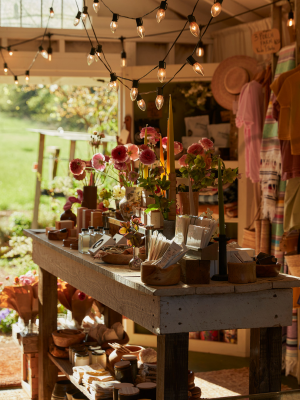
Mandy and Steve have aligned their farm store with the 3 Porch Farm's seasonal schedule—from mid-March to the first week of June; and from September 1st through the holidays.
Photo © Daniel Dent.
Most of the farms included in this report open their shops or stands at week’s end, after flowers are harvested and distributed through other channels. But the timing of being open on a Friday-through-Sunday or Thursday-through-Saturday schedule is also one that customers seem to prefer. After a few years of running Diddle & Zen’s seasonal farm stand, Abby and Derek dove deep into retail in 2023, opening a small flower shop in the nearby town of Vergennes, Vermont. Then, in 2024, they had an opportunity to expand to a larger storefront with 1,600-square-feet of production and retail space. “We opened there on May 1st, went into Mother’s Day, followed quickly by our first weddings and prom season; honestly, it was just too much for me to manage all of it,” Abby says. Because Derek works an off-farm job, it wasn’t realistic for him to manage the farm stand, either. “The one thing we kept hearing from shoppers at the store was, ‘we really miss the farm stand,’” she says. “I was kind of surprised, because it’s not hard to come into town to shop at our store, but people still loved going to the farm; they love its charm.”
For 2025, Abby plans to try a new schedule: The farm store will be open 10 a.m. to sunset on Sundays and Mondays, which are the two days when the retail shop is closed. “We’re going to be very specific about the items we stock and they may only be available at the farm stand. In addition to our flowers, we’ll have outdoor-themed items, like citronella cedar candles and magic fire sticks for your firepit.”
Mandy and Steve have aligned their farm store with the 3 Porch Farm’s seasonal schedule—from mid-March to the first week of June; and from September 1st through the holidays. “We like to open during the seasons when we have overflowing flowers that we can move through the store. The seasons when we are growing less also happen to be our downtime, when we really don’t want to be focusing on the store, so we close it then,” Steve says. He has a theory about this unique farm store schedule: “When we open things up after being closed for several months, all of a sudden, customers are clamoring. They’re flooding in there and we get more sales. So I think by concentrating a lot more sales in a smaller period of time, it generates more of a buzz.”
The 140-day Alaska farming season means that All Dahlia’d Up’s flower stand is entirely seasonal, Misty explains. “I like being open Thursday through Saturday, 10 a.m. to 6 p.m. Those three days are busy. The stand is open for Mother’s Day and occasional tulip pop-ups in May and June, but the regular schedule runs from mid-July through September.”
Insurance & Security
Everyone I spoke with says it’s important to have insurance when allowing the public to enter their private property. “Talk with your insurance agent to make sure you’re covered,” Steve advises. “Our building is covered and then we took out a separate policy for the products inside our store.” Because the farm store at 3 Porch Farm is set up for self-service, and not staffed, there is occasional theft. “However, we now have a camera that’s pointed to the parking area, so we can see license plates,” he adds.
A locked gate blocks shoppers from accessing the farm itself, Mandy and Steve explain. “They can shop here and have a cute experience, and look out the window to see flowers, and take pictures of the dahlia patch, but they can’t get onto the farm proper,” Mandy says. This setup protects the couple and their farm crew from distractions. While they love their customers, it’s easy to see how a simple customer greeting can turn into a 45-minute conversation that pulls them away from important farming tasks.
“We have pretty robust insurance—a regular business owners’ policy and an umbrella policy that covers personal liability,” Abby says. The insurance also covers private events that Diddle & Zen often hosts.
As much as they plan for safe and secure shopping experiences, accidents happen, Gretel points out. “No matter what you do, people are going to drive around and do crazy stuff. Even with all of our signs, we’ll occasionally find that someone has driven out to our greenhouses. Or, their car gets stuck in the mud and they have to call AAA. Things are going to happen. Guaranteed, someone is going to back into a tree or a rock!” For larger events, like their holiday open house, Gretel relies on a family member or employee to direct guests to park correctly.
Transactions & Sales
These farms use a mix of sales models. Charles Little & Co. and All Dahlia’d Up staff their on-farm retail shops; 3 Porch Farm, Sunny Meadows Flower Farm and Diddle & Zen use a self-service model. Here are some considerations to guide your decisions:
Staffed
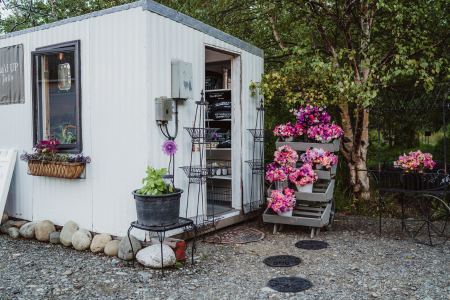
The flower stand at All Dahlia'd Up is staffed and doubles as a studio for fulfilling online orders.
Photo © Amber Lanphier.
Charles Little & Co. employs a farm stand manager who works Wednesday (when the stand is closed) and Thursday through Sunday during open hours. On Wednesday, the manager makes all of the bouquets and customer bunches to stock the farm stand. Bethany recommends using the prior year’s sales numbers to guide the amount of inventory produced. The product is kept on a designated rack in the farm’s walk-in cooler so it’s easy for the manager and two part-time sales assistants to restock over the weekend.
At All Dahlia’d Up, Misty and an assistant staff the flower stand. “We have to be staffed because we’re under the umbrella of Vanderweele Farms, our parent farm, and I just can’t let people come here willy-nilly.” Not only does she love the chance to interact personally with customers, she also uses the flower stand as a studio to fulfill online flower orders that are delivered locally using services like DoorDash and AK Delivered. Shoppers are also allowed to bring their own vase for Misty or her assistant to make a custom arrangement at the flower stand.
Self-Service (Honor System)
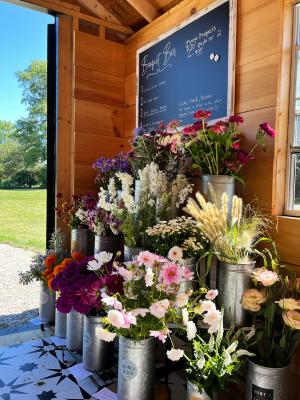
The farm stand at Diddle & Zen is self-serve. Instructions on the board let customers know how to help themselves at the "bouquet bar." Payment methods include cash, check, Paypal, and Venmo.
Photo © Abby Matson.
Increasingly, there’s an ease of buying flowers via self-service, thanks to QR codes and shopping apps like Venmo and PayPal, say farmers.
A board lists instructions for 3 Porch Farm shoppers, describing how they can pay via Venmo, PayPal, or with cash or checks. Accepting the potential of occasional theft is still far less costly than justifying paying an employee, Steve says. “It is very much like a human experiment for me; I’m so fascinated by people coming in and realizing that they can just shop by themselves. They say, ‘we pay you and you trust us?’ They seem to find it thrilling and weird and I love that it gives people a different shopping experience—and puts trust and responsibility into their hands in a different way.”
At Sunny Meadows Flower Farm, there is a cash box and Venmo instructions for shoppers. In order to keep transactions easier, they do not charge sales tax. “We back it out of the end,” Gretel explains of her bookkeeping process. “We also started having little IOU notes for people to let us know how much they spent, so we can then email them an invoice if they don’t have enough cash.” The Farmstand has visible security cameras, which she hopes deters thieves. “A lot of trust is involved. If there has been theft, the margins haven’t been enough” to warrant having a staff person there. Usually, though, an employee is tasked with checking the Farmstand throughout the day to restock bouquets, she says.
Diddle & Zen’s stand is also set up for self-service shoppers, Abby says. The honor system works well for customers who purchase bunches or market bouquets; they use the QR code to pay digitally or pop bills or a check in the old-fashioned cash box. “We leave out a big notepad and I love how people voluntarily write letters and notes to us,” she adds. “A lot of times, it’s from people who were in the area staying at an Air BNB and just happened upon the stand. They want us to know that it made their experience of exploring Vermont special.”
Bestselling Items
Charles Little & Co.’s farm stand stocks a wide range of products, including items grown and produced at the farm, as well as hanging baskets and potted plants sourced from local nurseries, and items that Bethany purchases from local artists, ceramicists, and makers. Ceramic mushrooms and slugs from Forest Floor Pottery, an Oregon potter, are favorite items. Locally-made candles are also popular, and the artisan is a beekeeper who keeps bees (and harvests the wax) from Charles Little & Co. The bees are also a source of flower farm honey, while the farm’s lavender is distilled into lavender oil; both are packaged with Charles Little & Co. labeling.
In keeping with the farm’s established reputation for selling dried flowers, Bethany carries supplies that crafters need – handmade wreath bases, wire, glue guns and a huge selection of dried flowers, including a bowl filled with dried flower heads for crafters to purchase the amount they need. “I know one of my big demographics is women who follow our Instagram for inspiration. Many of them come out here once a week to buy supplies. Or, they’ll ask to purchase the wreath they just saw on my front porch on social media,” she says. Workshop students also receive a 10%-off discount coupon for a one-time farm store purchase. All Dahlia’d Up uses the flower stand as a hub for many farm activities, such as guest check-in for walking tours or a special farm dinner. Not everyone purchases flowers, though, because All Dahlia’d Up attracts a lot of vacationers. “If people are traveling, they might buy a dahlia pendant or Alaska-grown potato chips. We also have branded merchandise, like our popular coffee mugs.”
Misty kicks things off with Mother’s Day tulips, the earliest local flower of the season for Alaska customers. That’s followed by pop-up sales of single-variety bunches of ranunculus and anemones, until the field crops come online by mid-summer. “Misty Mama is our best-selling item from July through September—it’s a medium-sized market bouquet. We have an entire family of bouquets, including Jenna Benna ($50) or Luke’s Lush, a big wrap that sells for $75.”
In addition to stocking the farm stand with 3 Porch Farm’s flowers, Mandy brings in other unique items, including pottery made by her mother, Linda Rovolis, and woodwork from her father, Tony Rovolis. “Mandy is a born, intuitive marketing genius,” Steve points out. “She’s constantly curating new items so that every time someone returns, the store is different. It’s always the same value point; it’s sustainably done; it’s artisanal and largely items by woman-owned businesses.” Their merchandise philosophy has changed over time, Mandy says. “We used to think we had to make everything we sold, but we learned this wonderful thing called ‘wholesale’—you buy at wholesale from someone else and sell at retail—it’s amazing. We can support another business and pay them what they want to be paid.”
Since the stand is not climate-controlled, Mandy and Steve are careful about the quantity of flowers on display. “We have enough for what we anticipate we need for the day’s flow and then we restock as needed,” she says. “On an average day, though, people might grab a bundle of flowers, but they add a candle and some hand salve and a vase,” which often means they spend more on non-floral items than the fresh blooms.
Mandy says she’s a big believer in “pile it high and watch it fly,” a philosophy that always worked for them at the farmers’ market. “I remember when other vendors would have little bits of things and we decided to go big and blow it out with all the flowers.” Similarly, with candles, 3 Porch Farm’s bestselling category, it’s all about having a colorful selection and variety. One of the most popular comes from Danica Designs, a Maine-based candle company that makes dipped tapered candles in every color of the rainbow.
After Mandy and Steve told their friends at Sunny Meadows Flower Farm about their success with candles, Gretel and Steve Adams decided to add candles. Laughs Gretel, “We bought in ceramics and candles and we had someone make soap for us—it wasn’t hugely successful. What we’re best at selling are our flowers—that’s what people come here for.”
The Farmstand stocks both mixed bouquets and single-variety growers’ bunches. Gretel says that she and Steve are mindful to not compete with themselves, so they tailor farmstand inventory that’s much different than what they sell to grocery stores or florists. “A customer will find a regular-size bouquet at the grocery store, but they’ll find a deluxe bouquet here,” she notes. “They’re paying $35 for our farmstand bouquets. If we have something really special or if it’s a holiday like Mother’s Day, we also have $45 bouquets and $65 vase arrangements. In the summer, people can also buy two bunches of foliage or filler (such as celosia or gomphrena) for $30—to add to our dahlia bouquets and make their own arrangements.”
The Farmstand also gives Sunny Meadows’ bouquet-makers the freedom to test out new design ideas. “Customers love our single-variety bunches with a mix of colors, such as peonies or mums or celosia.”
Silver Linings
Farmers are creative individuals adept at finding ways of doing more with less. For example, unsold flowers at Charles Little & Co.’s farm store aren’t thrown in the compost pile. They’re stripped, bunched, and hung in the barn loft for drying, Bethany explains. She also holds an end-of-year sale for her loyal crafting customers. “They can come in and buy whatever is on my shelves for 50 percent off.” That allows for a fresh, new batch of dried flowers when the farm stand re-opens on May 1st.
Their retail setting has played different roles over the decades, but Bethany says the past three years have been the most profitable. “We’ve been working hard to make it something different, an experience where people want to be. The farm store has achieved many things beyond revenue. It provides employment. It’s a space for people to come enjoy our farm, even if we’re not here to greet them. It brings in people who want to shop small and find quality products.”
Mandy and Steve know their farm store is a regional draw and they’ve become boosters for other small businesses in Comer, Georgia, population 1,599. “Most of our customers drive at least two hours just to get to us,” Steve points out. “We’re very remote, and now, many businesses in our little town have things happening during the first four hours on Saturdays. So we promote the ‘Comer Circuit’ when our farm store is open. We want people to shop in our community and visit all the other places that are open at that time.” Indeed, there’s a “Places of Interest” tab on the 3 Porch Farm website, featuring Steven and Mandy’s recommendations for dining, drinking, shopping, art, and nature destinations. A rising tide lifts all boats!
Learn More
- Planning & Planting
- 3 Easy, Reliable, Productive Cut Flowers • Our Recommended Short-List • Article
- Getting Started in Cut-Flowers • Top 15 Tier-1 Cuts • Article
- Succession Planting • Interval Chart for Flowers • CHART
- Succession Planting • Recommended Flowers • Table
- Top-10 Flowers for Direct-Seeding • Charticle
- Easy Cut-Flower Garden for Home Gardeners • Planner & Growing Guide • PDF
- Easy Cut-Flower Garden for Home Gardeners • MAP • PDF
- Cut-Flower Kit for Market Growers • Growing Guide • PDF
- Foliage & Fillers • Farmer–Florists Share Their Favorites • Article
- Harvest & Post-Harvest
- Marketing & Sales
- Pricing & Profitability for Today's Flower Farmer • Pointers from a Diversity of Pros • Article
- Tips for Starting a U-Pick Flower Operation • Article
- Collective Selling Models for Flower Farmers • 3 business models for disrupting the conventional wholesale marketplace: Legal Cooperative; Multi-Owner LLC; For-Profit Wholesale Business • Article


